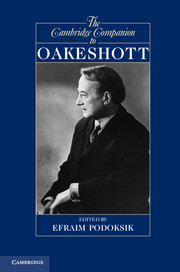Book contents
- Frontmatter
- Introduction
- Part I Oakeshott's philosophy
- Part II Oakeshott on morality, society and politics
- 6 Practical life and the critique of Rationalism
- 7 Oakeshott's ideological politics: conservative or liberal?
- 8 Rhetoric and political language
- 9 Oakeshott's On Human Conduct
- 10 Oakeshott's political theory: recapitulation and criticisms
- Part III Oakeshott and others
- Index
10 - Oakeshott's political theory: recapitulation and criticisms
from Part II - Oakeshott on morality, society and politics
Published online by Cambridge University Press: 28 September 2012
- Frontmatter
- Introduction
- Part I Oakeshott's philosophy
- Part II Oakeshott on morality, society and politics
- 6 Practical life and the critique of Rationalism
- 7 Oakeshott's ideological politics: conservative or liberal?
- 8 Rhetoric and political language
- 9 Oakeshott's On Human Conduct
- 10 Oakeshott's political theory: recapitulation and criticisms
- Part III Oakeshott and others
- Index
Summary
INTRODUCTION
For much of his career, scholars – especially in America – did not know quite what to make of Michael Oakeshott. Was he a Burkean conservative? The last gasp of British Idealism? An aesthete with aristocratic sympathies? A quasi-libertarian admirer of Henry Simons? A Hobbesian authoritarian? Or even a hyper-individualist with anarchist leanings?
That so many diverging, or even conflicting, interpretations of Oakeshott exist is partly due to the fact that his own thought significantly evolved over time, if not in content, then at least in form. His early writings are indebted to the legacy of the language of Idealist philosophy; his post-war essays bear a visible mark of revulsion from the changes European society was undergoing in those years and thus take on a distinctively conservative flavour; and in the subsequent period individualistic, even libertarian motives gradually become more prominent.
Previous chapters in this book have focused on analysing those particular stages in Oakeshott's social and political thought. The purpose of this chapter is, however, to examine what can be said about Oakeshott's political theory in general and to make a number of suggestions regarding the degree of satisfactoriness and relevance of its arguments to today's world.
- Type
- Chapter
- Information
- The Cambridge Companion to Oakeshott , pp. 222 - 244Publisher: Cambridge University PressPrint publication year: 2012
- 3
- Cited by



